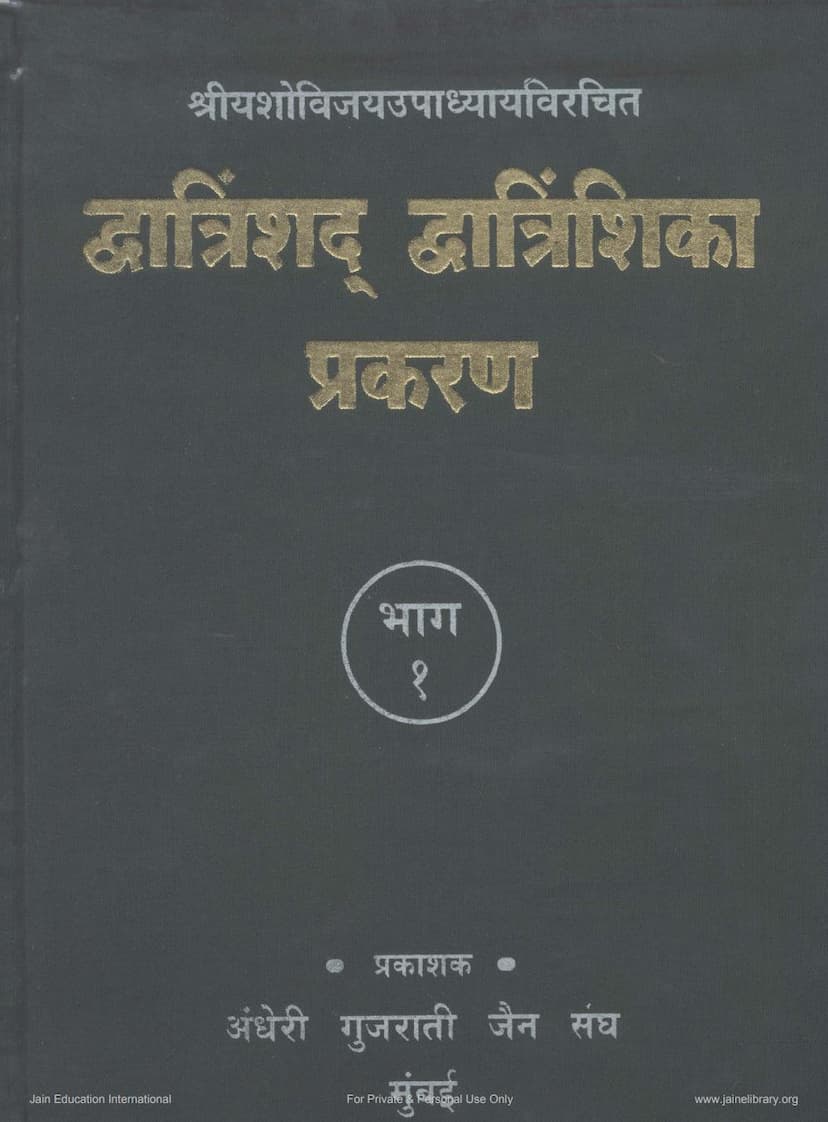Dwatrinshada Dwatrinshika Prakran Part 1
Added to library: September 1, 2025

Summary
Based on the provided pages, here's a comprehensive summary of the Jain text, "Dwatrinshada Dwatrinshika Prakran Part 1":
Book Title: Dwatrinshada Dwatrinshika Prakran Part 1 (द्वात्रिंशद् द्वात्रिंशिका प्रकरण भाग १)
Author: Yashovijay Upadhyay (Yashovijay of Jayaghoshsuri)
Publisher: Andheri Jain Sangh, Mumbai
Overall Theme and Structure:
The text is the first part of a larger work, "Dwatrinshada Dwatrinshika," which is a commentary and explanation of a significant Jain scripture by Mahopadhyaya Yashovijayji Maharaj. This particular part focuses on the initial sections (1 to 4 of the 32 "Bātrīsīs" or chapters). The core scripture itself, "Dwatrinshada Dwatrinshika," is a compilation of 32 chapters, each containing 32 verses, totaling 1024 verses across 32 subjects. The book primarily delves into Jain philosophy, conduct (achār), yoga, and spiritual principles.
Key Components and Contributions:
-
Original Work (Dwatrinshada Dwatrinshika):
- Authored by Mahopadhyaya Yashovijayji Maharaj, a highly respected scholar from approximately 350 years ago.
- The original work consists of 32 chapters, each with 32 verses, covering 32 topics.
- It primarily deals with Yoga and Spirituality, explained through the lens of Navya Nyaya (a later school of Indian logic and philosophy).
- The original work is considered a highly influential text in Yoga and Spiritual scriptures.
-
Commentaries and Editions:
- Tatvartha Dipika: Yashovijayji Maharaj himself wrote a brief critical definition of the Dwatrinshada Dwatrinshika, titled Tatvartha Dipika.
- Nayalata (नयलता): The current publication features a detailed Sanskrit commentary called "Nayalata" by Muni Yashovijay, a disciple of Panyas Shri Vishwakalyanvijayji Maharaj. This commentary is noted for its extensive referencing (over 1150 books) and its critical examination of yoga and philosophical principles. It aims to clarify the complex concepts of the original text and its commentary by Yashovijayji Maharaj using Navya Nyaya terminology.
- Dwatrinshika Prakash (द्वात्रिंशिका प्रकाश): A Gujarati commentary/explanation accompanying the Sanskrit Nayalata, also prepared by Muni Yashovijay.
- This Publication: The Andheri Gujarati Jain Sangh has published this work in eight parts, making the original text, along with the Tatvartha Dipika, Nayalata, and Dwatrinshika Prakash, accessible. This first volume covers the first four Bātrīsīs with detailed explanations.
Writer of Dwatrinshada Dwatrinshika (Mahopadhyaya Yashovijayji Maharaj):
- Born as Yashwant in Kanoda village (Gujarat), he was initiated into Jain monasticism by Muni Shri Nay Vijayji Maharaj and named Yashovijay.
- He studied extensively, including Nyaya and Shad Darshan (Six Schools of Indian Philosophy) in Kashi (Varanasi).
- He was renowned for his intellectual prowess, winning debates against renowned scholars.
- He was awarded the title "Upadhyaya" due to his scholarship and virtuous conduct.
- His writings, particularly Dwatrinshid Dwātrinśikā, are highly regarded in Yoga and Spiritual literature.
Writer of Nayalata and Dwatrinshika Prakash (Muni Yashovijay):
- Inspired by the ascetic preachings of Acharya Shri Vijay Bhuvanbhanusuriji Maharaj, he took Jain Diksha at the age of 18.
- He is a disciple of Acharya Bhuvanbhanusuriji's disciple, Poojya Panyas Vishwakalyan Vijayji Maharaj.
- He has intensively studied Jain Agamas, Buddhist Tripitaka, Vedic Upanishads, Gita, etc.
- His commentaries are praised for their scholarly depth, clarity, and extensive referencing (over 1150 books), aiming to make complex subjects accessible.
Content of Part 1 (Bātrīsīs 1-4):
- Bātrīsī 1 (Dan): Discusses the significance of Daan (charity/giving), its various forms (exoteric and esoteric), the conditions for giving, and the merits of giving to worthy recipients. It emphasizes the importance of pure intention.
- Bātrīsī 2 (Deshna): Focuses on Deshna (religious discourse/preaching), detailing who is a qualified recipient, when and how to preach, and the different types of listeners (child, intermediate, advanced). It highlights the importance of right speech and understanding the audience.
- Bātrīsī 3 (Marg): Elaborates on the Marg (path), specifically the path to Moksha (liberation). It discusses the importance of following the teachings of the omniscient Tirthankaras and the conduct of virtuous, learned monks (Gītārtha). It also touches upon the subtle nuances of conduct in different contexts.
- Bātrīsī 4 (Jin-Mahatva): Explores the Jin-Mahatva (greatness of the Jinas/Tirthankaras), comparing them with other deities and explaining their superiority based on their liberated nature, omniscience, and the perfection of their teachings. It likely uses logical arguments and references from various traditions to establish the greatness of the Jinas.
Key Features of the Publication:
- Comprehensive: The publication is noted for being in eight parts, covering the entire work in detail.
- Scholarly: The inclusion of Muni Yashovijay's "Nayalata" commentary, with its extensive referencing and analysis, highlights the scholarly nature of the work.
- Accessible: The Gujarati commentary ("Dwatrinshika Prakash") aims to make the profound philosophical and yogic concepts understandable to a wider audience.
- Historical Significance: The work preserves and makes accessible the profound teachings of Mahopadhyaya Yashovijayji Maharaj.
Overall Impression:
"Dwatrinshada Dwatrinshika Part 1" is a foundational text in Jain philosophy and practice, illuminated by Muni Yashovijay's extensive scholarship. It offers deep insights into Jain teachings on ethics, spiritual practices (yoga), and the path to liberation, all presented with rigorous logical analysis. The publication itself is a significant effort to make these ancient and profound teachings available to contemporary seekers.